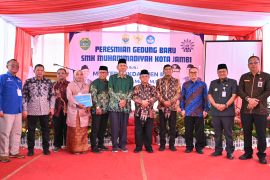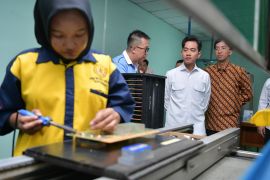"It is more so the safety aspects. For example, children have to walk quite a distance from home to school because we know what kind of risks there are in regional areas. Moreover, some kids have to cross bridges when it is still dark," Head of the Communication and Public Services Bureau at the ministry Siti Nadia Tarmizi told ANTARA here on Wednesday.
Schools and parents must ensure the safety of children on the way to school, she stressed.
She said that a school start time of 5 a.m. is still plausible as long as children get enough rest or sleep, which is about eight hours a day.
Parenting patterns also play a crucial role in children's health and stamina. Meeting children's nutritional needs will reduce any sluggishness or drowsiness they feel when they have to go to school early in the morning.
"Getting sleepy is not because of the time being too early; it can also be because they lack blood, or are anemic. That, too, will cause drowsiness and sluggishness, and they will tend to have a slower thought process due to lack of oxygen in the brain," she explained.
She advised the schools to host Nutrition Act initiatives, wherein students feast together at school in the morning, while educating others about the importance of nutrition, so as to promote healthy nutritional intake.
"By doing this initiative — which we expect to see at least once a week, wherein they have breakfast together at school — children will know which foods are good for them," she added.
The initiative will also allow schools to monitor students' eating patterns.
Tarmizi also highlighted the rampant trend of parents giving instant foods in school lunch bags. Meanwhile, there are others who are not paying attention to nutritional balance, for instance, by providing instant noodles and rice together for lunch.
"We encourage the fulfillment of animal proteins. With this program, we expect for changes in parents’ and children’s behavior," she said.
The initiative can be emulated in schools through cooperation with School Health Units (UKS) and local public health centers, she added.
Public health centers can educate parents on the importance of food and nutrition for children to prevent stunted growth.
Some time ago, the East Nusa Tenggara government issued a policy requiring Kupang high schoolers to come to school at 5 a.m. The policy came into effect on February 27, 2023.
The policy was adopted on the basis of a directive issued by East Nusa Tenggara Governor Viktor Bungtilu Laiskodat.
Related news: Ministry calls for review of early school start time
Related news: Kupang's 10 high schools commence learning activities at 5:30 a.m.
Translator: Pamela Sakina, Mecca Yumna
Editor: Rahmad Nasution
Copyright © ANTARA 2023












